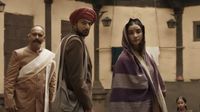The release of the biographical Hindi film Phule, directed by Ananth Mahadevan and starring Pratik Gandhi and Patralekhaa, has been postponed by two weeks from its original date of April 11, 2025, to April 25, 2025. This decision follows significant backlash from various Brahmin organizations in Maharashtra, who have raised concerns regarding their portrayal in the film, claiming it incites caste divisions.
Phule chronicles the lives of 19th-century social reformers Jyotirao Phule and Savitribai Phule, who were pivotal in the fight against caste and gender inequality. However, after the film's trailer was released, Anand Dave, President of the Brahmin Federation, criticized the film for allegedly promoting casteism. He called for a more inclusive portrayal that acknowledges the contributions of progressive Brahmins who supported the Phules during their reform movements.
In response to the controversy, former state minister Chhagan Bhujbal met with Mahadevan and the film’s producers to mediate the issue. Bhujbal remarked, “This is a Hindi film based on the life of Mahatma Phule. It seems that the director and the rest of the group have put in a lot of hard work, hence this film should be seen by all, Mahatma is a great work, not only in the country but it should reach all over the world.”
Further complicating the film's release, the Central Board of Film Certification (CBFC) initially granted Phule a 'U' certificate but later demanded several edits to the final cut. These changes include the removal of a voiceover referencing the caste system and the exclusion of historically sensitive terms such as 'Mahar', 'Mang', 'Peshwai', and the 'Manus system of caste'. Additionally, some dialogues were revised to ensure suitability for a general audience.
Mahadevan has stated that he aims to remain faithful to historical accuracy rather than exaggerate for dramatic effect. He explained, “We don't get into a film with these kinds of doubts and fears in mind... You don't deserve to make the movie if you're going to carry such fear when discussing a fearless couple like Jyotiba and Savitribai.” He emphasized that the film is grounded in historical truth and not guided by any ideological agenda.
To further address the concerns raised, Mahadevan held discussions with members of the Brahmin community, clarifying that certain Brahmins had indeed supported Jyotirao Phule’s initiatives, including the founding of around 20 schools and the Satyashodhak Samaj. He asserted, “Actually, because it's so dramatic, you have to downplay a lot of things!”
The film's narrative has sparked a broader discussion about caste representation in Indian cinema. Critics argue that while the film aims to highlight caste-based prejudice, it overlooks the contributions of Brahmins to the reform movements. Dave criticized the film's portrayal, stating, “The story is one-sided. We are not opposed to the truth being shown, but it should be inclusive. The film could inflame caste-based tensions.”
In the wake of these developments, the NCP (SP) has criticized the CBFC for its actions, accusing the board of double standards. Jayant Patil, the Maharashtra NCP (SP) president, pointed out that the CBFC has never objected to films like The Kashmir Files or The Kerala Story, which have been labeled as propaganda, yet it quickly raised objections to Phule.
“The casteist censor board has tried to strengthen the casteist mindset by suggesting alterations in the film. The producers had left with no option but to accept them,” said NCP (SP) MLA Jitendra Awhad. He added that the ongoing controversy might actually benefit the film by enlightening viewers about the historical injustices faced by marginalized communities.
The film's release has become a focal point for discussions around caste dynamics in contemporary India. As the release date approaches, many are watching closely to see how the filmmakers navigate the sensitive issues surrounding caste representation and historical accuracy.
In a recent post on X, Maharashtra Congress Legislature Party leader Vijay Wadettiwar criticized the government for taking the names of reformers like Phule, Shahu, and Ambedkar while simultaneously opposing a film based on their legacy. He stated, “This is nothing but a suppression of the ideologies of Phule, Shahu, and Ambedkar. Putting pressure on the film producer is muzzling the ideology.”
As the film’s new release date approaches, the filmmakers remain hopeful that the adjustments made will satisfy the CBFC and the concerned communities. Mahadevan has reiterated his commitment to presenting an accurate portrayal of the Phules’ contributions to society, stating, “Unfortunately, what Jyotiba and Savitribai began in the middle of the 1800s still holds true today... Because people's mindsets need to shift, it will take time.”
The controversy surrounding Phule exemplifies the ongoing struggle for representation and acknowledgment of historical figures in Indian cinema, as well as the complexities involved in addressing sensitive social issues. With its new release date set, all eyes will be on how audiences receive this biopic amidst the backdrop of such fervent discussions.









